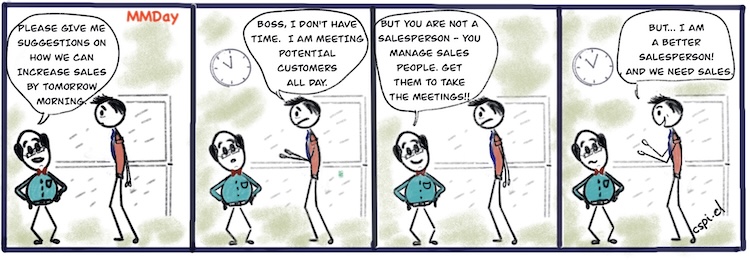I was tasked with changing the culture in the branches of the Royal Trust Company in Canada from administrative to sales focused. The branches were divided into divisions and in each division I appointed a Divisional Sales Manager.
Sales was positioned as ensuring customers were aware of what products and services could be provided. For example, a teller on completing a transaction for a customer may ask “are you aware of our new, no fee MasterCard Credit card?”.
We knew that customers for each of our branches came from a geographic area within 10 km. We knew the demographics of the inhabitants and were able to target specific products and services to that demographic. Each branch manager was tasked with holding a weekly sales meeting during which the sales activities of the branch and it’s success rate were discussed. The divisional sales manager would attend one or more of these meetings in a week to coach the manager and the team.
What soon became apparent was that these meetings were not being held as often as directed. The managers reported that they had various problems needing urgent attention and therefore unable to hold the sales meetings. What became clear was that the ”problems” that managers were having were related to their role before becoming a manager. If they had been in mortgages their problems would be mortgage problems. If they came from investments their problems would relate to client meetings regarding their investments. If they came from an administrative background their problems would be administrative in nature.
You get the picture.
It is only natural for a manager to be tempted to get involved in problems or opportunities that relate to their previous role. The more experienced and successful they were in their pre-manager ”doer” role the greater is the temptation.
As a manager you need to recognize that your role is very different to that of the doer. A manager is achieving results through other people and is focussed on orchestrating the work to be done, improvements to be made, staff to be developed and results to be achieved. Activities such as planning, delegating, coaching, hiring, developing staff, improving processes and reporting results fill most of their day. It is so easy to get distracted from these proactive activities. And the biggest distractions are problems linked to their previous role as they are so comfortable in dealing with them. And they are tuned into any problem or opportunity related to their doer role.
Looking at your day
The following exercise will help you see if you are holding onto your previous role:
Check your calendar and todo’s for the last two weeks. See how much work is directly related to your previous role. Give it a percentage score – %hrs, %type of work.
Also score the amount of time your were involved in proactive managing work.
This exercise will give you a clear view of your situation.
Holding onto your old role is unfair to the current incumbent of that role as they are missing out on experience and, also, will limit thinking for themselves – “I will ask the Manager” attitude.
If the percentage is high, then you are not devoting the right amount of time to managing and that, over time will negatively affect your results.
Say Goodbye to your previous doer role
I suggest that you formally say goodbye to your previous role. Write the role name on a piece of paper, tear it in little pieces and throw them in your waste basket. Then delegate any of your doer activities you are hanging onto.
Happy Managing.

